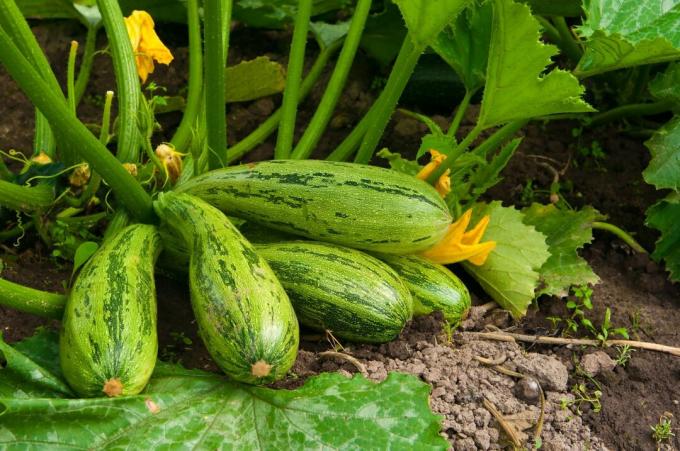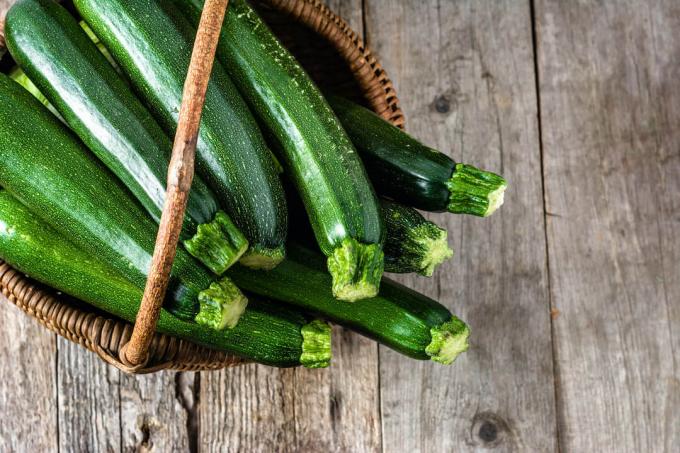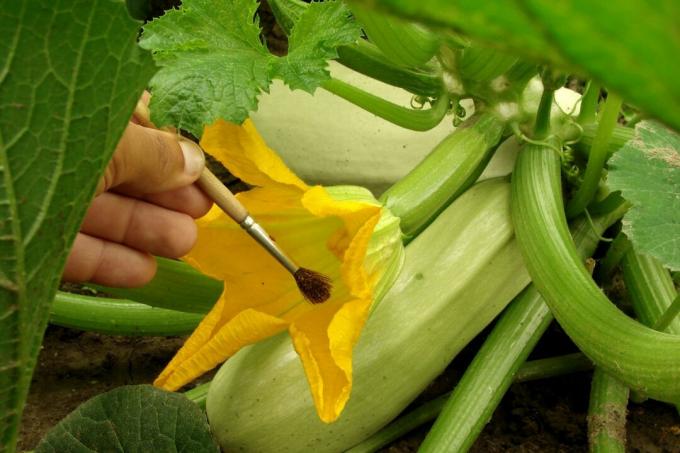Bitter zucchini can appear in the garden or in the supermarket. We explain how the bitter substances get into the zucchini and how dangerous they are.

Every now and then it can happen in the garden that a zucchini fruit tastes bitter. But how dangerous is the bitter substance and can zucchini be poisonous? In this article we explain about the poisonous cucurbitacin in zucchini.
contents
-
Can zucchini be poisonous?
- Can home-grown zucchini be poisonous?
- Can zucchini from the supermarket be poisonous?
- How do I recognize poisonous zucchini?
- Bitter zucchini eaten: what to do?
Can zucchini be poisonous?
the zucchini (Cucurbita pepo subsp. pepo convar. giromontiina) belongs to the large cucurbitaceae family. Many species in this family naturally produce poisonous bitter substances, the so-called cucurbitacins. They have been so reduced by breeding in some species that we
Cucumber (Cucumis sativus), pumpkin (Cucurbita maxima, C. moschata & C. pepo) and can also enjoy zucchini without hesitation. Sometimes, however, through crossing or a spontaneous reverse mutation, the genes for bitter substance production can reappear or reappear. As a result, pumpkin and zucchini taste bitter. Cucurbitacin is toxic to humans; ingestion leads to nausea, vomiting and diarrhea. For example, a pensioner ate very bitter zucchini made from self-grown seeds in a casserole in 2015 and tragically died as a result.Can home-grown zucchini be poisonous?
With self-rearing through seeds and reverse mutations, it is quite possible that the dangerous bitter substance is formed again in the cucurbits. Some zucchini fruits also take on a slightly bitter taste if the growing conditions are not particularly good. If the plants are stressed, for example due to extreme heat or insufficient water supply, bitter zucchini can also develop.

Can zucchini from the supermarket be poisonous?
In exceptional cases, you can also find zucchini with cucurbitacin in the supermarket, although the growers use certified seeds. It is the same as with bitter gourds a natural phenomenon that can never be completely ruled out due to spontaneous reverse mutation or non-varietal, cross-linked seeds.
How do I recognize poisonous zucchini?
The plant gives off clear warning signals when it contains the cucurbitacin: With an extremely bitter taste and smell. So if a zucchini tastes bitter inedible, then it should definitely not be consumed! It is a misconception that the bitter substances in zucchini are particularly healthy.
In addition, not only raw zucchini are affected, but also cooked dishes with these vegetables carry a risk, because the bitter substance is not destroyed when heated. To be really sure, it is advisable to try a raw piece of zucchini before consuming it. With normal zucchini taste, the mild, sometimes almost sweet aroma should spread in the mouth. If the taste is bitter, the zucchini should be disposed of.
As a preventive measure, only controlled crossed seeds should be used in the home garden. Zucchini are naturally foreign pollinators, the plants develop purely male and purely female flowers. You can easily get along with too Butternut squash and Co. cross. If you want to obtain zucchini seeds yourself, pollination must be carried out by hand in the early morning hours and the fruit must be labeled after it has been fertilized. It is particularly important here to gently close the flower that would open the following day, preferably with a paper tape or something similar. In this way you can prevent insects from pre-empting manual pollination with foreign pollen. Even after pollination, the flower has to be closed again and thus made inaccessible until the fruit is formed. If you're not entirely sure which species your zucchini has crossed with, you should go to Use controlled seeds from specialist retailers and not your own seeds continue to cultivate.

Bitter zucchini eaten: what to do?
Zucchini poisoning with cucurbitacin is noticed within minutes to hours after eating Typical signs of intoxication: nausea, vomiting, diarrhea as well as headaches and dizziness can be the first signs be. If you have eaten a bitter zucchini and develop malaise or the above symptoms, contact a doctor immediately.
At a glance: Why bitter zucchini can be poisonous
- In fact, the natural bitter substances in zucchini were grown so far away that they are no longer toxic to humans.
- Due to crossbreeding, reverse mutations or poor growth conditions, the poisonous bitter substance cucurbitacin can still reappear in zucchini.
- To prevent bitter zucchini in your own garden, you should only use controlled seeds.
- Zucchini from the supermarket can rarely contain the poisonous cucurbitacin.
- Do not eat zucchini that smells or tastes bitter!
- Symptoms of zucchini poisoning: nausea, vomiting, diarrhea, headache, dizziness.
With the right one Care of zucchini some bitter fruits can be prevented. We give you tips on water requirements, fertilization, diseases and pests.
